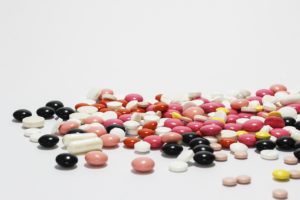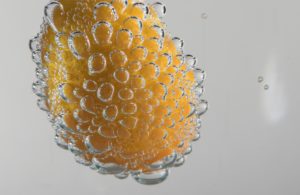Metallic Taste – Episode 109

Glossary
Aguesia: no taste
Hypoguesia: reduced ability to taste (no the same as when taste changes due to changes in ability to smell)
Dysgeusia: dysfunctional taste (bad, salty, rotten, or metallic taste). Metallic is most common.
Causes for Change
Chemotherapy and radiation for cancer causes taste changes because the taste buds are rapid-cycling cells and the goal of chemo and radiation is to kill fast-growing cells (cancer cells are definitely fast-growing).
Head trauma or brain damage may damage the path of taste from the mouth to the brain.
Conditions like GERD, diabetes, urinary retention, and dry mouth can cause dysgeusia. Zinc deficiencies can too (in case you can’t tell, zinc plays a big role in many processes in your mouth).
Over 250 medications can causes changes in taste. These include blood pressure medications, antibiotics, chemotherapy, asthma medications, and lithium. Some of them are secreted in the saliva, so the change in taste is because you actually taste the medicine. Other changes are because the medication disrupts or alters receptor or signal transport (i.e. ion transport – sodium, calcium, potassium, or chloride).
My Own Metallic Taste
I was taking generic Biaxin, AKA clarithromycin, for a sinus infection. Clarithromycin is in a class of medication called macrolides. Macrolides work on infections by disrupting the DNA-copying proteins in the bacteria. They are known as bacteriostatic antibiotics, which means they stop the bacteria from growing and dividing, but do not kill them. This allows your own immune system to get rid of the bacteria itself.
It was the worst! Everything tasted so bad. I had to take it for 10 days, so I spent those 10 days eating the strongest and spiciest foods I could find to try and cover it up.
Your saliva contains clarithromycin in a concentration of ~2.72 mg/L. To get an idea of how small this amount is, it takes you 12-24 hours to produce 1 liter of saliva. Only 3-7% of adults report metallic taste with clarithromycin.
Connect with me
Support us on Patreon
Join the Pharmacist Answers Podcast Community on Facebook
Subscribe: iTunes, Stitcher, GooglePlay, TuneIn Radio
Music Credits: Up In My Jam (All Of A Sudden) by – Kubbi https://soundcloud.com/kubbiCreative Commons — Attribution-ShareAlike 3.0 Unported— CC BY-SA 3.0 http://creativecommons.org/licenses/b…Music provided by Audio Library https://youtu.be/tDexBj46oNI


